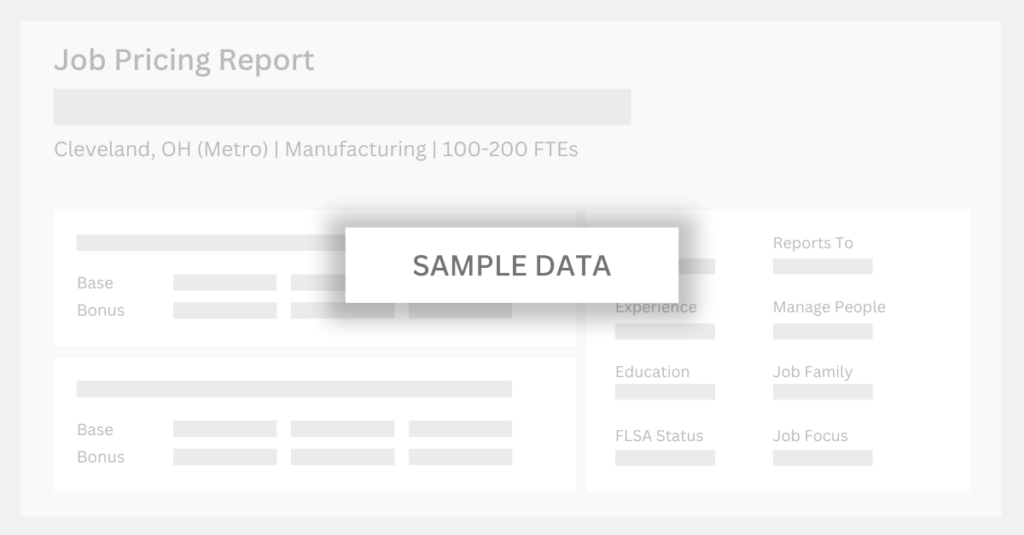Compensation Data for a Buyer in Ohio

Compensation data breakouts:
- Location (example: Cleveland, Akron, Ohio, National)
- Company Size (number of full-time employees)
- Industry (industry-specific or all industries)
- Years of Experience
- Education
Data included in each report:
- Base Compensation (Salary or Wage)
- Total Compensation
- Bonus
- Long-term Incentives
- Job Description
- Competencies/Skills
Get a Free Sample Report
Submit the form below to receive a sample job pricing report or to access ERC’s compensation data.

ERC is a leading provider of compensation data
Whether you’re actively recruiting and hiring or trying to stay competitive, having local salary and wage data is critical. ERC members gain access to compensation reports, job description research, and an HR Help Desk for compensation and workplace practices data.
Job Description
Overview
- Procures materials or other goods and/or coordinates activities involved with purchasing products and services, such as raw materials, equipment, tools, parts, supplies, and advertising, for establishment.
- Receives and reviews requisitions requesting goods or services.
- Communicates with vendors to obtain product or service information, such as price, availability, and delivery schedule.
- Selects products for purchase by testing, observing, or examining items.
- Expedites orders and requests as needed.
Typical Functions
- Estimates values according to knowledge of market price.
- Determines method of procurement, such as direct purchase or bid.
- Prepares purchase orders or bid requests.
- Reviews bid proposals and negotiates contracts within budgetary limitations and scope of authority.
- Maintains procurement records, such as items or services purchased, costs, delivery, product quality or performance, and inventories.
- Discusses defective or unacceptable goods or services with inspection or quality control personnel, users, vendors, and others to determine source of trouble and take corrective action.
- Keeps abreast of market trends, changes in business practices in the assigned markets, new or altered types of materials entering the market, etc.
- May work with manufacturers or persuade potential vendors to undertake the manufacturing of custom-designed items according to user’s specific needs and specifications.
- May approve invoices for payment.
- May expedite delivery of goods to users.
Similar Positions
There are several positions that share similar responsibilities to a Buyer, including:
- Procurement Specialist
- Purchasing Agent
- Materials Buyer
- Sourcing Specialist
- Strategic Buyer
- Purchasing Coordinator
- Procurement Officer
Experience and Education
Buyers typically need a combination of education, experience, and skills to excel in their roles. While a bachelor’s degree in business, supply chain management, or a related field can be beneficial, practical experience in procurement, purchasing, or supply chain operations is highly valuable. This can be gained through internships, entry-level purchasing positions, or relevant industry experience.
Strong analytical skills, attention to detail, and the ability to analyze market trends, negotiate contracts, and manage vendor relationships are essential. Buyers should have knowledge of procurement processes, supply chain management principles, and familiarity with relevant industry regulations.
Proficiency in using procurement software and tools, along with good communication and interpersonal skills, is important for effective collaboration with suppliers, stakeholders, and internal teams. Adaptability, problem-solving abilities, and the ability to work in a fast-paced and dynamic environment are also crucial for success as a buyer.
Competencies and Skills
- Procurement and sourcing
- Supply chain management
- Market analysis
- Negotiation skills
- Vendor management
- Communication and collaboration
Why ERC Compensation Data?
Through frequent polls and surveys, ERC offers a comprehensive collection of recent, reliable data covering workplace practices, employee compensation, benefits, wages, and salaries from local, regional, and national samples.
While “free” compensation data can be found on the web, here’s why you should be cautious:
- Validity — Often “free” salary data is collected from anyone willing to participate or share information. This means you don’t have a good sense of how big the sample size is, the geography of the data, or the type or size of organizations from which the data is being collected.
- Recency — ERC’s survey data relies on regular and consistent participation to ensure that the data is recent, while “free” pay data sources may provide data that is many years old.

